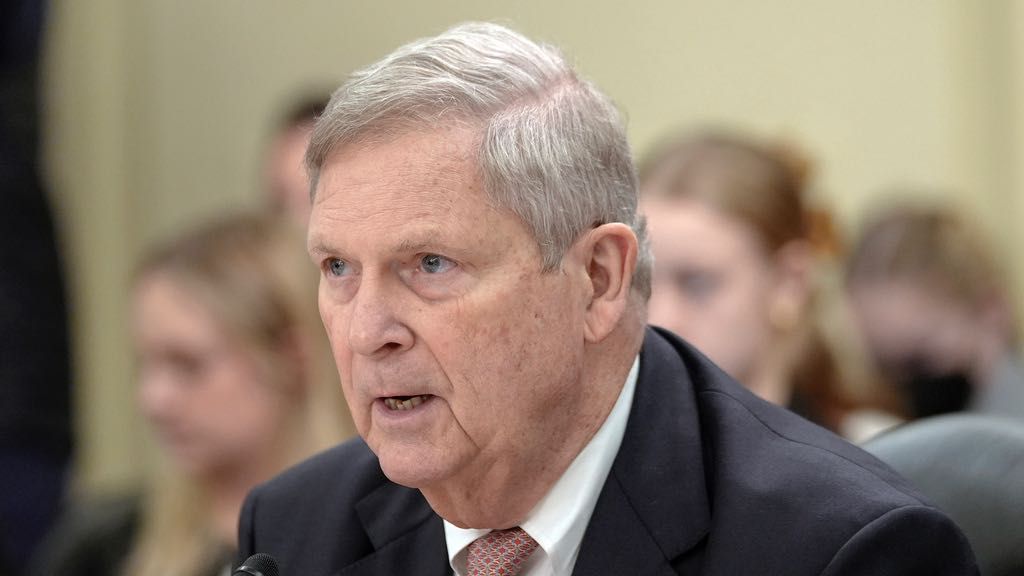A bipartisan group of senators is calling on U.S. Agriculture Secretary Thomas Vilsack to take immediate action after several tribal nations reported that a federal food distribution program they depend on has failed to fulfill orders for months and, in some cases, delivered expired food.
Last spring, the U.S. Department of Agriculture reduced the number of suppliers it uses to deliver food to Indian reservations for its food distribution program from two to one. In a letter to Vilsack on Friday, the senators expressed concern that Native American families across the country are experiencing “extreme disruption.”
“Participating households have not received regular food deliveries for over four months,” the senators wrote. “This is unacceptable.”
The Associated Press exclusively obtained a copy of the letter on Thursday before it was sent to the USDA chief.
Democratic Senator Jeff Merkley of Oregon said he was stunned to hear from five tribal nations in his state this summer that they had struggled to support their families since consolidation.
“USDA must address this self-inflicted crisis quickly and comprehensively,” Merkley said in a statement. “There can be no more excuses for food delays, missed deliveries or the delivery of expired products.”
In addition to Merkley, Republican Senators John Hoeven and Kevin Cramer of North Dakota and Markwayne Mullin of Oklahoma, as well as Democrats Martin Heinrich of New Mexico, Ron Wyden of Oregon and Tina Smith of Minnesota, support the letter.
More than 50,000 Native American families depend on this food, says Mary Greene-Trottier, who directs food distribution for the Spirit Lake Nation and is president of the National Association of Food Distribution Programs on Indian Reservations.
“They have to go without,” Greene-Trottier said. “Imagine going to the supermarket during Covid or a winter storm and the shelves are empty. That’s the feeling they get.”
Representatives of the Spirit Lake Nation, a North Dakota tribe with about 7,600 members, said an order this month was only partially filled and another the month before never arrived.
“We didn’t know our trucks weren’t coming until they didn’t show up,” Greene-Trottier said.
In a July letter to Secretary Vilsack, she and other tribal officials expressed skepticism that the remaining contractor, Paris Brothers Inc., would have enough time to become the sole provider of food deliveries to dozens of tribal nations. The Kansas City, Missouri-based food wholesaler was given just four weeks to prepare for the increased workload, the letter said.
Paris Brothers Inc. said in a statement that the company is “actively addressing” recent challenges.
The USDA has been providing updates in weekly phone calls with tribal leaders, and a consultation with tribes is planned for next month in Washington, DC.
The decision to consolidate was the result of a competitive bidding process, and Paris Brothers was the only company the USDA board found suitable to meet the need. To help the contractor handle a larger inbound shipment, the agency has allocated USDA staff to assist with customer service work with tribes and is working with the Federal Emergency Management Agency to support the company’s logistics program.
“Our first task was to get food to where it is needed,” the agency said in a statement. “We are also currently reviewing our procurement processes to prevent similar circumstances from recurring in the future.”
The agency is also helping tribes take advantage of other federal programs that can provide additional food and resources, and has offered tribal nations $11 million to address food shortages while Paris Brothers tries to catch up.
But Greene-Trottier said the money likely won’t be enough, and tribal leaders have been told they won’t be eligible to be reimbursed for additional costs. She’s relying on other programs and scarce resources to fill in the gaps. The Spirit Lake Nation and others have even offered to drive to Missouri to pick up their food orders themselves, but Greene-Trottier said that request was denied by the USDA.
On Thursday, Spirit Lake Nation officials said outstanding orders from July would be canceled and not fulfilled. Vice Chair ReNa Lohnes said the tribe has not yet received its share of the $11 million, leaving them scrambling for solutions and not knowing how, if at all, they will be able to recover.
Lohnes said she had concerns from the beginning when the USDA announced the change, but she never imagined they would be where they are now. “I thought we were going to have to fight for food,” she said. “We were told it’s coming, it’s coming, it’s coming. And we wait and wait and nothing.”

